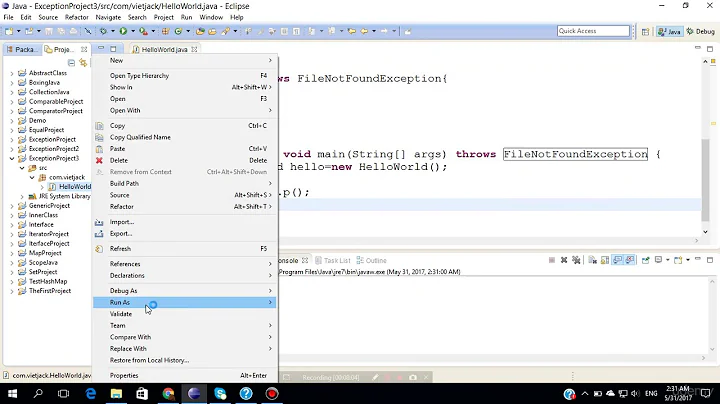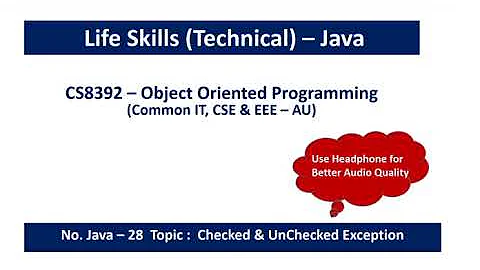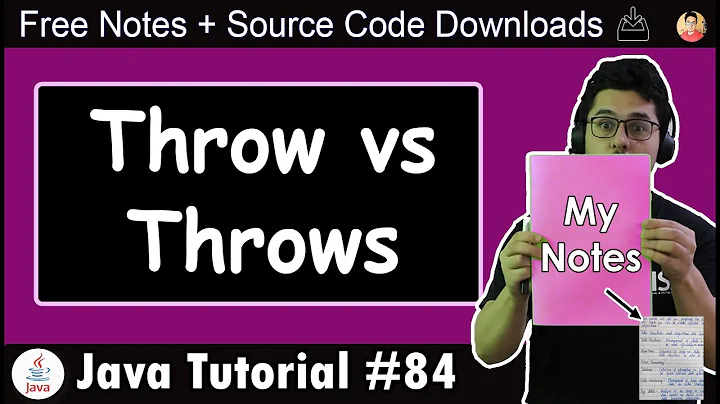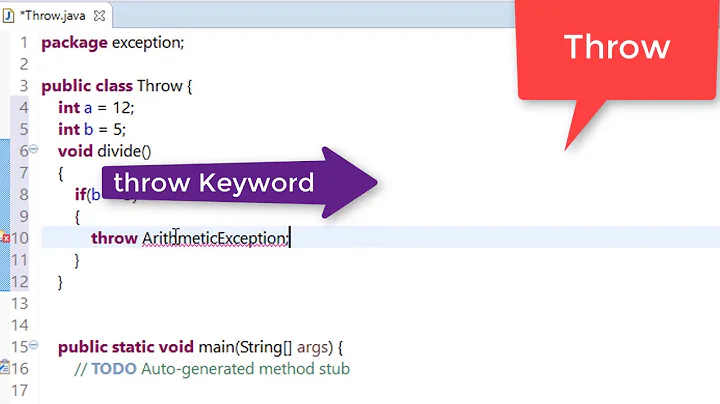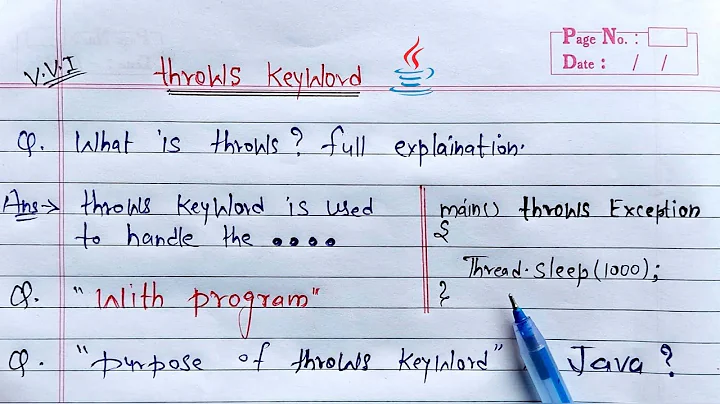How to use Java-style throws keyword in C#?
Solution 1
In Java, you must either handle an exception or mark the method as one that may throw it using the throws keyword.
C# does not have this keyword or an equivalent one, as in C#, if you don't handle an exception, it will bubble up, until caught or if not caught it will terminate the program.
If you want to handle it then re-throw you can do the following:
try
{
// code that throws an exception
}
catch(ArgumentNullException ex)
{
// code that handles the exception
throw;
}
Solution 2
The op is asking about the C# equivalent of Java's throws clause - not the throw keyword. This is used in method signatures in Java to indicate a checked exception can be thrown.
In C#, there is no direct equivalent of a Java checked exception. C# has no equivalent method signature clause.
// Java - need to have throws clause if IOException not handled
public void readFile() throws java.io.IOException {
...not explicitly handling java.io.IOException...
}
translates to
// C# - no equivalent of throws clause exceptions are unchecked
public void ReadFile()
{
...not explicitly handling System.IO.IOException...
}
Solution 3
Yes this is an old thread, however I frequently find old threads when I am googling answers so I figured I would add something useful that I have found.
If you are using Visual Studio 2012 there is a built in tool that can be used to allow for an IDE level "throws" equivalent.
If you use XML Documentation Comments, as mentioned above, then you can use the <exception> tag to specify the type of exception thrown by the method or class as well as information on when or why it is thrown.
example:
/// <summary>This method throws an exception.</summary>
/// <param name="myPath">A path to a directory that will be zipped.</param>
/// <exception cref="IOException">This exception is thrown if the archive already exists</exception>
public void FooThrowsAnException (string myPath)
{
// This will throw an IO exception
ZipFile.CreateFromDirectory(myPath);
}
Solution 4
Here is an answer to a similar question I just found on bytes.com:
The short answer is no. There are no checked exceptions in C#. The designer of the language discusses this decision in this interview:
http://www.artima.com/intv/handcuffs.html
The nearest you can get is to use the tags in your XML documentation, and distribute NDoc generated docs with your code/assemblies so that other people can see which exceptions you throw (which is exactly what MS do in the MSDN documentation). You can't rely on the compiler to tell you about unhandled exceptions, however, like you may be used to in java.
Solution 5
After going through most of the answers here, I'd like to add a couple of thoughts.
Relying on XML Documentation Comments and expecting others to rely on is a poor choice. Most C# code I've come across does not document methods completely and consistently with XML Documentation Comments. And then there's the bigger issue that without checked exceptions in C#, how could you document all exceptions your method throws for the purpose of your API user to know how to handle them all individually? Remember, you only know about the ones you throw yourself with the throw keyword in your implementation. APIs you're using inside your method implementation might also throw exceptions that you don't know about because they might not be documented and you're not handling them in your implementation, so they'll blow up in face of the caller of your method. In other words, these XML documentation comments are no replacement for checked exceptions.
Andreas linked an interview with Anders Hejlsberg in the answers here on why the C# design team decided against checked exceptions. The ultimate response to the original question is hidden in that interview:
The programmers protect their code by writing try finally's everywhere, so they'll back out correctly if an exception occurs, but they're not actually interested in handling the exceptions.
In other words, nobody should be interested in what kind of exception can be expected for a particular API as you're always going to catch all of them everywhere. And if you want to really care about particular exceptions, how to handle them is up to you and not someone defining a method signature with something like the Java throws keyword, forcing particular exception handling on an API user.
--
Personally, I'm torn here. I agree with Anders that having checked exceptions doesn't solve the problem without adding new, different problems. Just like with the XML documentation comments, I rarely see C# code with everything wrapped in try finally blocks. It feels to me though this is indeed your only option and something that seems like a good practice.
Related videos on Youtube
Comments
-
Louis Rhys almost 2 years
In Java, the
throwskeyword allows for a method to declare that it will not handle an exception on its own, but rather throw it to the calling method.Is there a similar keyword/attribute in C#?
If there is no equivalent, how can you accomplish the same (or a similar) effect?
-
 Giuseppe Accaputo over 13 years+1 for using
Giuseppe Accaputo over 13 years+1 for usingthrow. By using it, the stack trace won't get lost. -
Louis Rhys over 13 years"it will bubble up", does this means that this is equivalent to all methods having a throws clause in Java?
-
 Oded over 13 years@Louis RH - kind of. It means an exception, if not handled, will go up the call chain through each calling function till handled.
Oded over 13 years@Louis RH - kind of. It means an exception, if not handled, will go up the call chain through each calling function till handled. -
TheSpy over 13 years@Louis RH not completely, that would mean you had to catch the Exception at least in you Main to compile the code. Because C# doesn't know checked exceptions it's up to you to catch them otherwise they will just land in the runtime and interrupt your code.
-
Gabe over 13 yearsI can't imagine how checked exceptions would mix with lambdas!
-
TheSpy over 13 years@Gabe: I'm sure you could come up with some concept that allows you to mix them, but like I said, checked exceptions are in Java also mostly not good practice, especially in more complex applications. So it's good they are not there in C#.
-
Louis Rhys over 13 years@jwatcher: a main method can have a throw clause too.
-
Hari Lubovac about 8 yearsOP, this is your answer. I'm guessing, but JAVA's
throwslikely means nothing to the runtime, aside from being informative to the developer. Likewise, what @mvanella pointed out here is the C#'s way to do exactly the same. I'm assuming you already know that this "xml documentation" has more significant purpose. I know this thread is old. -
VikciaR over 7 years@johannes: you don't need to catch exceptions "to compile code". C# compiler doesn't enforce you to do that - it's up to programmer to decide what to do: uncatched exceptions handle it or let it crash application.
-
 Amir Ziarati almost 7 years@LouisRhys its not the same, because the caller doesn't know what exceptions may happen in the method !!!! lets accept its one of rare cases C# is weaker than java :(
Amir Ziarati almost 7 years@LouisRhys its not the same, because the caller doesn't know what exceptions may happen in the method !!!! lets accept its one of rare cases C# is weaker than java :( -
 Ashish Kamble over 5 yearsIts sad to hear that C# is really weaker in exception handling, we may end up in run time termination its very sad, must need
Ashish Kamble over 5 yearsIts sad to hear that C# is really weaker in exception handling, we may end up in run time termination its very sad, must needthrowslike keyword. -
 Oded over 5 years@AshishKamble - eh. Matter of opinion. Exception handling is different in .NET. Don't assume you know what's "better".
Oded over 5 years@AshishKamble - eh. Matter of opinion. Exception handling is different in .NET. Don't assume you know what's "better". -
Pedro Lima almost 5 yearsActually, Java does not bubble up exceptions unless it is explicitly specified in a
throwsclause or thrown by athrowcommand. That means if a RunTimeException occurs and is not handled in the same method where it occurs, the execution will stop there. -
 proximab over 3 yearsPlease make some edit of answer. I accidentally clicked -1. I can't remove it until you make any change.
proximab over 3 yearsPlease make some edit of answer. I accidentally clicked -1. I can't remove it until you make any change. -
Falkreon about 2 yearsJava exceptions always bubble up the call chain, that's what exceptions do. The only... exception to this, pardon the pun, is lambdas which often eat them. The difference in java is that checked exceptions exist. The compiler will force you to check the exception or rethrow it at each step up the chain. The JVM finally prints the stack trace as a last resort after the exception has bubbled all the way past the main method.
-
 Balázs Börcsök about 2 yearsThis makes (from a programming standpoint) the readability much worse than Java.
Balázs Börcsök about 2 yearsThis makes (from a programming standpoint) the readability much worse than Java. -
Sanjay about 2 yearsBecause of the "throws" clause, the Java compiler is able to help you finding subtle errors already at compile time. In C#, the compiler is of no help in this regard, and you are pretty much left alone with the task of making sure that all critical exception are handled (of which you may not even know they can occur, if they are thrown much deeper in third-party or open source components you are using...) So in short: in Java you find these kinds of problem already at compile time, in C# you find them only after you have shipped your software when it runs in production... :-(



